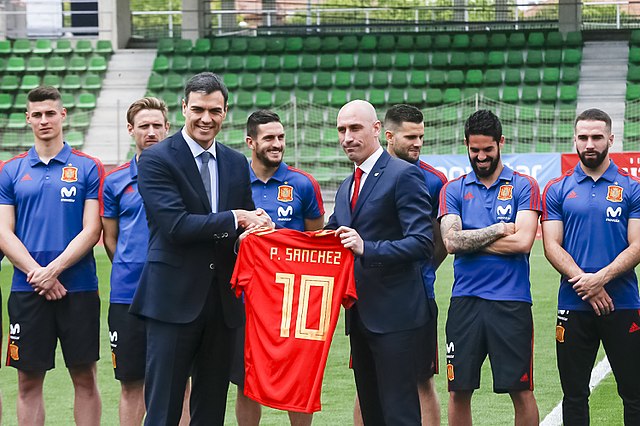
By Dr Kamran Khan
Associate Professor in Language, Social Justice and Education, School of Education
Recently, the Spanish women’s national team became campeonas in Australia at the World Cup. Their play relied on intelligence, movement, possession, and no little skill. Spain produces some of the most exhilarating and beautiful football in Europe in all forms of the game. And yet, there is so much wrong and distasteful with the Spanish football landscape.
Structural shortcomings and an inability to be accountable at institutional levels in relation to misogyny and racism in full view of the world raises concerns. Despite finally leaving his post after three weeks of scrutiny this weekend, the fallout of the Rubiales affair, the former head of the RFEF (Royal Spanish Football Federation) and UEFA vice-president, who kissed Jenni Hermoso without her consent following Spain’s victory over England was there for all to see. Initially the response was a seemingly false statement by the RFEF released on behalf of Hermoso asserting the kiss was consensual. At one point, Hermoso was threatened with legal action by the RFEF. After this Rubiales stated at a press conference, ‘No voy a dimitir’ (I am not resigning) to applause.
Towards the end of the 2022-3 season, the brilliant Brazilian forward Vinícius Junior was repeatedly targeted for racial abuse during the season culminating in the league game against Valencia when he was sent off whilst playing for Real Madrid. In a statement at the time, Vinícius Junior stated, ‘Racism is normal in La Liga. The competition thinks it’s normal, the federation does too, and opponents encourage it. I’m so sorry. The championship that once belonged to Ronaldinho, Ronaldo, Cristiano [Ronaldo] and [Lionel] Messi, today belongs to racists.’ In this case, La Liga, initially claimed Viníus Junior was being manipulated in stating La Liga was racist…
It is worth reflecting on these events as they tell us much about how the most important Spanish organisations such as the RFEF and La Liga are unable to ensure a safe workplace for footballers in the women’s game and Black players in the men’s game. In each case, there is much more to the events than the singular moments themselves. The Rubiales incident came after 12 players refused to work with the national manager in the lead up to the World Cup and instead withdrew from the biggest tournament of their lives rather than play under him. This was following 15 players in September 2022 sending emails to the RFEF complaining of the need for change under the now sacked coach Jorge Vilda. However, backed by Luis Rubiales, Vilda was supported by the RFEF despite the concerns of the players. Trouble has been on the horizon for some time.
Similarly, the Vinícius Junior moment is the latest in a long line of racism toward Black players in Spain. For example, Samuel Etoo and Roberto Carlos both Black players for Real Madrid and FC Barcelona are two high profile examples. Returning to the Rubiales and Vinícius Junior cases, both the RFEF and La Liga were asking the public to disbelieve what was in front of them and to downplay what had happened. It was as Groucho Marx once remarked a case of ‘who are you going to believe, me or your own eyes?’. However, what was inescapable, as writer Musa Okwonga stated, they were indicted by their own actions and words. The reflex action was to support their own and no amount of backtracking could change this.
This leads to two central concerns about the Spanish game. First, there has been an inability to be accountable. Surviving and buying time to remain in power has been more of greater importance than to improve the game, or at least the image of the game. This tells us much about the structures, people and power within these organisations. Those who require protection find the organisations around them not only unable to do so but impotent in holding abusers accountable.
Second, if this is what happens in full view of the world, what happens elsewhere where there are no famous people and cameras? Perhaps one of the reasons for the outcry is that many can relate and identify with the misogyny and racism. Jenni Hermoso is quite possibly the most famous woman in Spain right now while Vinícius Junior is quite possibly the most visible Black immigrant, yet none of this provided any protection while the perpetrators have been protected. It is perhaps why the two cases have resonated so greatly with the general public as women and racially minoritised populations have be able to relate to cases where there has been no protection nor satisfactory resolution to misogynistic and racist abuse they have faced.
In Sara Ahmed’s book, Complaint! she argues that when there is protection in processes of complaint, the protected often reflect an investment by others. Who gets protected in these cases and why? It is certainly not women and Black players in the men’s game nor is it for the betterment of Spanish football. If the organisations are unable to reform from the inside, then they must be reformed from the outside and made accountable as Ignacio Escolar stated on Cadena Ser. For all the mesmeric football that Spain produces, its image is sullied by such structures and people with the most power in the game and it’s unlikely to change any time soon.
- Find out more about Dr Kamran Khan
- Back to Social Sciences Birmingham
The views and opinions expressed in this article are those of the author and do not necessarily reflect the official policy or position of the University of Birmingham.
